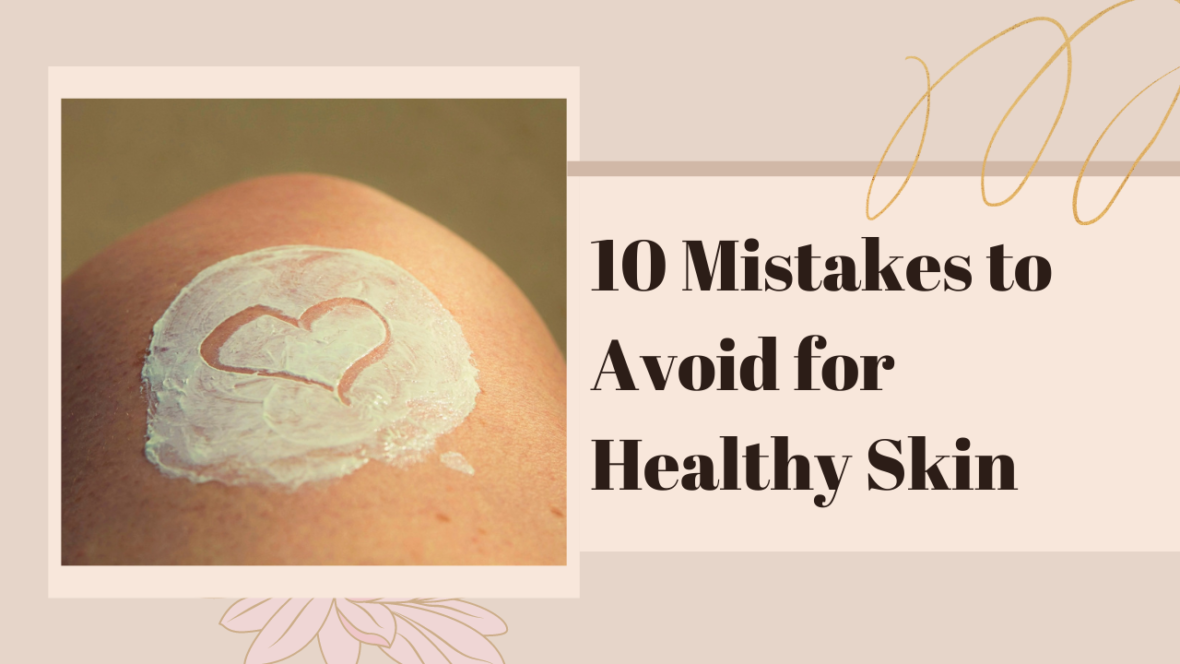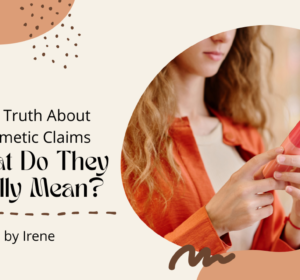It is true that most of us like makeup and use it frequently. Since we like or due to our job requirements, we wear makeup every day. There is a debate whether it is good to wear makeup every day or if we should give rest to the skin every now and then. In principle, there is nothing wrong with wearing makeup every day, makeup itself will not damage your skin. However, we should avoid certain mistakes or habits which may damage the skin. In this post, I present you 10 mistakes to avoid for healthy skin.

Mistakes to avoid for healthy skin
Do not cleanse your skin before applying makeup.
It is important to apply makeup over clean skin, not only to get a flawless look but also to keep healthy skin. Normally the skin is covered by a mixture of dirt, the rest of applied products, sweat, sebum, dead cells, bacteria, etc. When you apply makeup on top of all of that you are trapping that mixture between the makeup and the skin. That can cause different problems, from redness, blackheads and pimples to infection. Always wash your face before using makeup.
Sleep on makeup
This mistake is an extension of the previous mistake. Sometimes we are very tired and feel tempted to sleep on makeup, which happens to me very frequently. However, you should always remove the makeup before going to bed. During sleeping time, our skin regenerates from the daily aggressions. That is what we call “let the skin breathe”. If the skin is covered with makeup during this regeneration time, the clogged pores can lead to acne or more serious skin problems.

Use bad quality or dirty brushes
You should use good quality brushes. I don’t mean that you should use expensive brushes, you can buy very good quality brushes at affordable prices nowadays. Bad quality brushes can have hard bristles which may scratch your skin. These injuries can be a source of infection. Try to use brushes with soft bristles.
Independent of the brushes you use, you should make sure that they are clean. Brushes are in close contact with our skin and a dirty brush can contain bacteria responsible for infections, mainly the brushes used for applying liquid or cream products.

Use makeup that does not work for your skin type
Some products are indicated for oily skin while other work better for dry skin people. The ingredients each product contain are different and using the wrong product may have a negative effect.
The products indicated for dry skin contain ingredients that can clog pores of people with oily skin while the products for oily skin people may contain ingredients to reduce sebum production which can make dry skin even drier. Always check the product skin recommendations and keep in mind that what works for a person may not work for you.
Share makeup
We are now very much concerned about sharing products (well, we are now paranoic about sharing anything) as sharing makeup has always been a very bad habit. There is nothing wrong with sharing certain types of products. For example, a foundation that comes with a pump dispenser. When you use this product, you normally pump some product on the back of your hand and the dispenser is never in contact with your skin.

However, products which are in contact with your skin as eyeliners, lipsticks, mascaras, etc. are important to keep for personal use only. Sharing them may transfer bacteria from one person to another.
You may ask what happens with powder products such as eyeshadows, blushers, bronzers or highlighters. There is some controversy about sharing this type of product. Some people think that there is no harm in sharing them if each person uses a clean brush. However, normally you touch the product with the brush after the brush has been in contact with the skin (normally you need more than a swipe). That may contaminate the product. Anyway, the risk of contamination for this type of product is lower than in products that directly touch the skin. What do you think?
Using expired makeup
You should check not only the expiry date of the product but also the Period After Opening (PAO), which is even more important for cosmetic products. I already explained in a previous post the risk of using expired products.
Using products with harmful ingredients
All makeup products go through different tests to warranty that the product will not be harmful. However, there are certain polemic ingredients that are better to avoid. They can affect your skin in different ways. Always read the ingredient list before buying any makeup for the first time.
Using an excess makeup
In this life, anything is better in the right amount and excess is not good. Though certain makeup product does not harm the skin, you should always apply them in the right amount. Too much product may be harmful to the skin.
Store makeup in a wrong way
It is important how you store the makeup. You should store all your makeup properly closed, preferably in a cool and dark place. If possible, store it out of the bathroom. This room is a humid area and that can increase mould and microorganism growth on your makeup.

Skip moisturiser and sunscreen before makeup
This is not a makeup related mistake itself, but I wanted to include it here as the application of moisturiser and sunscreen should be the first step of the makeup process.
The skin needs to be hydrated in order to be healthy. Makeup products can lead to dehydrated skin (even if your skin is normally oily) and the use of moisturiser underneath makeup helps to avoid this dehydration.
On the other hand, I will never insist too much on the importance of protecting your skin from sun radiation even during cold and cloudy days.
Skipping these two products can have very negative effects on your skin.
Let me know in the comments if you make any of the mentioned mistakes or if you know any other mistakes which I did not mention in this post. Let us learn from each other.

Bear in mind that some of the links in this post are affiliate links and if you go through them to make a purchase I will earn a commission. Keep in mind that I link these companies and their products because of their quality and not because of the commission I receive from your purchases. The decision is yours, and whether or not you decide to buy something is completely up to you.



